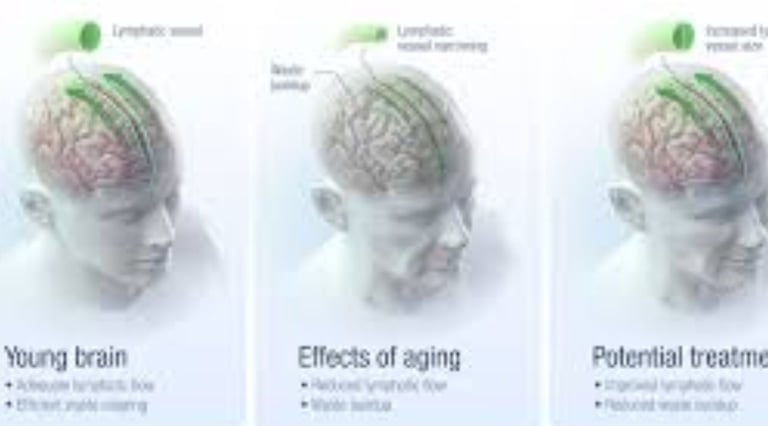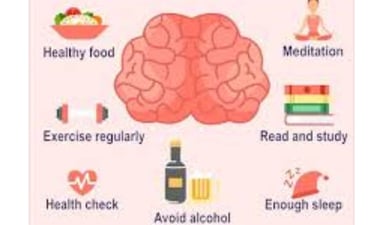
Health is a crown on the heads of the healthy that only the sick can see.

🧠⏳ Fasting = Sharper Brain & Slower Aging
🧘♂️💡 Fasting boosts brain function, slows aging, and helps you feel younger—naturally, safely, and powerfully.
NEUROPSYCHIATRY
Dr Hassan Al Warraqi
7/3/2024
🧠⏳ Fasting = Sharper Brain & Slower Aging
🧘♂️💡 Fasting boosts brain function, slows aging, and helps you feel younger—naturally, safely, and powerfully.
Fasting has a positive effect on nerve health and regeneration
Increased production of indole-3-propionic acid (IPA): A study in mice showed that intermittent fasting led to increased levels of IPA in the body, a compound that has antioxidant properties and promotes the growth of new nerves.
Stimulating autophagy: Fasting is thought to stimulate autophagy, a process in which cells remove and recycle damaged components, which may help repair damaged nerves.
Reducing inflammation: Fasting can reduce inflammation in the body, which is one of the main factors that contribute to nerve damage.
Improving brain functions: Some studies have shown that fasting may improve brain functions, including memory and learning, and may have a positive effect on overall nerve health.
Research in this area is still in its early stages
Fasting may have other benefits for nervous system health
Improve mood: Fasting may help reduce symptoms of depression and anxiety.
Protecting the brain from damage: Fasting may protect the brain from damage resulting from stroke and other neurodegenerative diseases.
Promoting overall brain health: Fasting may help improve cognitive and brain functions
Autophagy
Basic biological process: It is a natural process that occurs within the body's cells, where cells recycle their damaged or unnecessary components.
Fasting stimulates autophagic processes
The importance of autophagy:
Maintains cell health and prolongs their life.
It helps prevent chronic diseases such as cancer, heart disease, and Alzheimer's.
Boosts immune functions.
how
Reducing insulin levels:
When fasting, insulin levels in the blood decrease, which in turn stimulates the autophagy process.
Increased glucagon levels:
The hormone glucagon, which is secreted during fasting, also stimulates the autophagy process.
Activation of the AMPK pathway:
Fasting stimulates the AMPK pathway, a cellular signaling pathway that plays an important role in regulating the autophagy process.
Benefits of autophagy stimulation:
Improve brain health:
Autophagy helps remove beta-amyloid proteins that accumulate in the brain, which cause Alzheimer's disease.
Boost immune functions:
Autophagy helps remove disease-causing microbes from the body.
Improve heart health:
Autophagy helps reduce inflammation and improve heart function.
Anti-aging:
Autophagy is believed to help slow the aging process and improve overall cell health.
The effect of fasting on autophagy varies from person to person, depending on many factors, such as general health condition, type of diet, and duration of fasting.
Fasting may affect mental performance
Regular fasting can improve attention, concentration, and general mental function.
Stimulating hormones: Fasting can lead to an increased secretion of hormones that enhance the autophagy process.
Activation of signaling pathways: Fasting can activate signaling pathways associated with autophagy, such as the mTOR pathway and the AMPK pathway.
Regulation of metabolism: Fasting can regulate metabolism and increase the body's use of stored nutrients, which enhances the autophagy process.
Reducing cellular irritation: Fasting can reduce cellular irritation and the harmful effect of free radicals, promoting cell health and stimulating autophagy.
Improving brain functions, anti-aging, reducing cellular irritation, regulating metabolism, activating signaling pathways, stimulating hormones, improving heart health, enhancing immune functions, improving health, reducing inflammation, brain, autophagy, glucagon, reducing insulin levels,
DW
https://www.dw.com/ar/%D8%A7%D9%84%D8%B1%D8%A6%D9%8A%D8%B3%D9%8A%D8%A9/s-9106
youtube
https://www.youtube.com/watch?v=6g9zXfR5ttM
msd
https://www.msdmanuals.com/ar/home
FAQS
What is Intermittent Fasting and What Are Its Different Types?
Intermittent fasting (IF) is an eating pattern that alternates between periods of eating and fasting. It aims to improve health by targeting cellular aging and cardiovascular risk factors. Common types of intermittent fasting include:
Time-Restricted Eating (TRE):
Restricting food intake to specific hours of the day, allowing a daily fasting window of over 12 hours.Alternate-Day Fasting (ADF):
Fasting completely for 24 hours every other day, or modified fasting with severe calorie restriction (about 70% reduction) on fasting days.Fasting-Mimicking Diet (FMD):
A low-calorie, low-protein, low-carbohydrate, and high-unsaturated-fat diet followed for five consecutive days each month.5:2 Diet:
Eating normally for five days a week and severely restricting calories (500–700 calories) for two non-consecutive days.Voluntary Fasting:
Includes religious or self-imposed fasting practices, such as Islamic voluntary fasts (e.g., Mondays, Thursdays, or the "White Days").
How Does Intermittent Fasting Affect Cardiovascular Health?
Studies suggest intermittent fasting can improve several cardiovascular risk factors:
Lower Blood Pressure: Reduces blood pressure and heart rate, lowering heart disease risk.
Improved Lipid Profile: Decreases LDL ("bad" cholesterol) and increases HDL ("good" cholesterol).
Blood Sugar Control: Enhances insulin sensitivity and reduces blood sugar levels, aiding in type 2 diabetes prevention.
Reduced Inflammation: Lowers chronic inflammation linked to heart disease and atherosclerosis.
Weight Loss: Helps reduce excess weight, particularly visceral fat, which is associated with heart disease risk.
What Molecular Mechanisms Improve Heart Health Through Intermittent Fasting?
Intermittent fasting enhances heart health via several molecular pathways:
Autophagy Activation:
Promotes cellular cleanup by removing damaged components via reduced mTOR activity and activation of AMPK and TFEB.Reduced IGF-1 Levels:
Lowers insulin-like growth factor 1 (IGF-1), inhibiting mTOR and activating autophagy.Sirtuin 1 (SIRT1) Activation:
Activates SIRT1, an enzyme regulating autophagy and longevity.Mitochondrial Function Improvement:
Reduces free radical (ROS) production and enhances mitochondrial efficiency, preventing oxidative stress.Inflammation Reduction:
Suppresses inflammatory pathways and lowers inflammatory markers.
What Are Other Potential Benefits of Intermittent Fasting Beyond Heart Health?
In addition to cardiovascular benefits, intermittent fasting may:
Enhance Brain Function: Boosts memory, learning, and protects against neurodegenerative diseases like Alzheimer’s.
Combat Aging: Slows aging by stimulating autophagy, reducing inflammation, and improving insulin sensitivity.
Improve Mood: May alleviate symptoms of depression and anxiety.
Promote Cell Regeneration: Stimulates tissue repair and cellular renewal.
Are There Risks or Side Effects of Intermittent Fasting?
While generally safe, intermittent fasting may pose risks for certain groups:
Uncontrolled Diabetes: May complicate blood sugar management.
Children, Teens, and Elderly: May not suit their nutritional needs.
Pregnant Women: Not recommended during pregnancy.
Heart or Kidney Conditions: Requires medical consultation.
History of Eating Disorders: May trigger disordered eating behaviors.
Muscle Loss: Some studies suggest potential muscle loss, though others dispute this.
Potential Heart Risks in Specific Cases: Caution is advised for elderly individuals or those with cardiovascular diseases due to limited data on risks tied to fasting protocols and comorbidities.
What Foods Should You Eat When Breaking a Fast?
Focus on nutrient-dense, whole foods:
High-Quality Protein: Grass-fed meats, wild-caught fish.
Healthy Fats: Avocado, coconut oil, nuts, butter.
Unprocessed Carbs: Low-sugar berries, leafy greens, zucchini, quinoa, sweet potatoes.
Hydration: Drink plenty of water.
Avoid: Sugar and alcohol.
How to Start Intermittent Fasting?
Start Gradually: Begin with a 12–13 hour fasting window and extend it to 16 hours.
Stay Hydrated: Drink water, black coffee, or unsweetened tea during fasting.
Be Consistent: Maintain a regular fasting schedule.
Consult a Doctor: Seek medical advice if you have chronic health conditions.
Allow Adaptation: Full benefits may take 6–8 weeks to manifest.
Can Intermittent Fasting Slow Biological Aging?
Some studies suggest intermittent fasting, particularly the Fasting-Mimicking Diet (FMD), may slow biological aging by:
Improving Pre-Diabetic Markers: Reducing insulin resistance and HbA1c levels.
Lowering Liver and Belly Fat: Decreasing metabolic syndrome risks.
Boosting Immunity: Enhancing immune function.
Reducing Immunological and Biological Aging: Potentially extending lifespan and lowering age-related disease mortality.
Voluntary Fasting and Anti-Aging
The connection between voluntary fasting in Islam and the concept of anti-aging bridges spiritual/religious and scientific/health perspectives.
Here’s an explanation of this relationship from both angles:
1. Islamic Perspective: Fasting as Worship and Strengthening the Body and Soul
Worship and Spiritual Longevity:
Voluntary fasting (e.g., fasting on Mondays and Thursdays, or the fast of Prophet Dawud [David]) strengthens willpower, elevates the soul, and purifies the heart from sins.This spiritual "renewal" can enhance life quality and slow psychological aging.
The Prophet Muhammad (peace be upon him) said: “Fasting is a shield” (Sahih al-Bukhari), meaning protection from sins and psychological ailments.
General Health Benefits in Islamic Teachings:
The Sunnah hints at the health benefits of fasting, such as the Prophet’s saying: “Fast, and you will attain health” (reported by Al-Tabarani, graded as fair by some scholars).Though its authenticity is debated, it reflects Islam’s holistic link between worship and physical well-being.
2. Scientific Perspective: Intermittent Fasting and Aging
Modern studies suggest that intermittent fasting (resembling some Islamic voluntary fasting practices) may slow aging through mechanisms like:
Autophagy Activation:
A cellular "cleanup" process that removes damaged components, improving cell function and reducing age-related diseases (e.g., cancer, Alzheimer’s).
Improved Insulin Sensitivity:
Reducing insulin resistance helps prevent diabetes and heart disease, both of which accelerate aging.
Reduced Oxidative Stress:
Fasting decreases free radical production, which damages cells and contributes to aging.
Longevity Gene Activation:
Some research indicates fasting activates genes (e.g., SIRT1) linked to healthy lifespan extension.
Overlap Between Islamic Voluntary Fasting and Anti-Aging Practices
The Fast of Dawud (Alternate-Day Fasting):
Similar to intermittent fasting regimens (e.g., 16:8 or Alternate-Day Fasting), studied for their role in cellular renewal.
Fasting on Mondays, Thursdays, or the "White Days" (13th, 14th, 15th of the lunar month):
These create cyclical fasting patterns that stimulate cellular repair without exhausting the body.
Islamic Balance:
Islam prohibits perpetual fasting (fasting every day), aligning with medical advice to avoid over-fasting and its adverse effects.
Key Notes
Intention First:
The primary goal of voluntary fasting in Islam is worship and closeness to Allah, not health benefits. However, Islam welcomes secondary benefits as part of its holistic approach.
Moderation:
Health conditions must be considered. Elderly individuals or those with chronic illnesses (e.g., diabetes) should consult a doctor before fasting.
Holistic Approach:
Anti-aging requires a comprehensive lifestyle (nutrition, exercise, sleep, etc.), with fasting being one component.
Conclusion
Voluntary fasting in Islam—when practiced moderately—can serve as both a spiritual and health tool to slow aging and improve life quality. However, it is not a "magic pill" but works synergistically with other factors. Combining sincere religious intention with modern science maximizes its benefits.
✍️ Author Bio
Dr. Hassan Al Warraqi
Founder of H-K-E-M.com | Advocate of Neuroplasticity, Natural Longevity & Therapeutic Fasting
Dr. Hassan Al Warraqi combines neuroscience with ancient healing strategies, exploring how fasting promotes brain regeneration, protects against cognitive decline, and enhances natural vitality. Through H-K-E-M.com, he delivers evidence-based protocols for those seeking holistic brain health and anti-aging solutions.
🔗 Learn more: https://h-k-e-m.com
📱 Social Media Caption (Instagram / Facebook / LinkedIn):
🧘♂️💡 Fasting = Brain Boost + Youthful Energy
Fasting isn't just about weight — it’s about rebuilding from the inside out.
🧠 Boosts neuroplasticity
⏳ Slows cellular aging
✨ Enhances clarity, memory, and focus
🌿 All without drugs or stimulants
✅ Natural
✅ Safe
✅ Powerful
Ready to activate your best brain yet?
🖊️ Learn the science-backed protocol at [h-k-e-m.com]
#BrainHealth #Neuroplasticity #FastingBenefits #NaturalLongevity #AntiAging #MentalClarity #HKEM #HassanAlWarraqi #CognitiveWellness #HolisticHealth









